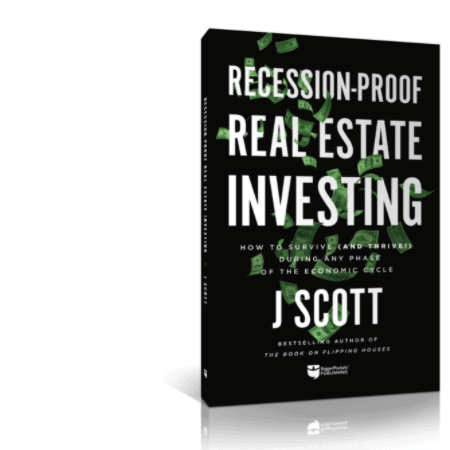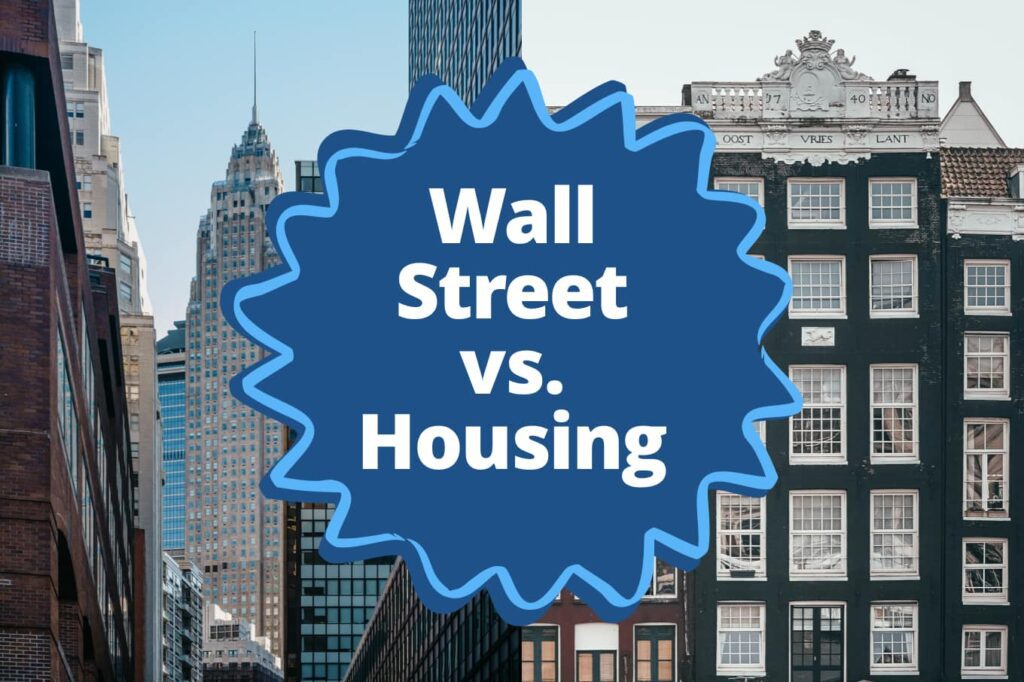There’s been a lot of hype over the past several months about Wall Street’s run on the housing market. I’ve seen a few dozen headlines about how no one can buy a house because big institutional investors are buying up all the houses. Being the skeptic I was, I wanted to see if this was actually true.
Dig into the data and information to uncover what Wall Street’s role in today’s red-hot housing market is, as well as the risks to both Wall Street homebuyers and small-time investors over the long term. To do this I looked at some data from Redfin, which shows that the share of homes bought by investors currently stands at 15.9%. For context, that’s still slightly below where we were pre-pandemic, when investors were buying about 16.1% of all homes in the US.
Check out this graph below with data from Redfin. As you can see, the share of homes purchased by investors is recovering from a sharp decline last spring, but is only now approaching where we were a few years ago.
Now, it’s very hard to measure the share of investors, but I looked at some reports from Redfin, John Burns Real Estate Consulting, and CoreLogic—all respected firms in the real estate industry. And while they all had different methodologies, they all showed the same pattern: investor home buying hasn’t reached new highs since the pandemic. And some reports, such as those from John Burns, suggest that investor homebuying peaked around 2013.
This provides a strong indication that investor activity is not causing an increase in home prices. Nothing has really changed with regards to what percentage of homes are being bought by investors. In all cases, Wall Street investor activity is either down or worst compared to small-scale investor activity over the past decade.
If we want to focus on large investors, recent data is hard to come by. However, a 2018 Corelogic survey estimated that only about 1% to 2% of all single-family purchases were made by large investors, while about 18% were made by small investors.
Another data point suggests that Wall Street activity today is not boosting this chaotic housing market. Instead, the housing market is being driven by fundamentals:
- very low inventory
- Rising demand from Millennials entering home buying age
- low interest rates
The current housing market is more a function of these three factors than the activity of institutional investors. However, that may be about to change. These institutional investors aren’t dominating the housing market yet, but they have some serious advantages over regular homebuyers or small-time investors like me. And I worry about what may happen in the years to come.
Who are Wall Street investors?
As we dive into this topic, let’s first define who exactly these Wall Street or institutional investors are. The largest of all the companies is Invitation Homes, which—to no one’s surprise—is an arm of BlackRock, the world’s largest asset management company. Invitation Homes has approximately 80,000 single-family residences in 16 US markets, which is undoubtedly huge.
In fact, it’s so big that they’re about 58% bigger than one of their closest competitors, American Homes 4 Rent. But, to put this into perspective, there are about 16 million single-family rental homes in the US, and Invitation Homes owns about 0.5% of them.
There are an estimated 80 million single-family residences in the US and Invitation Homes own only one-tenth of 1% of that. To reiterate, these types of companies are large, but they do not currently control the housing market.
However, companies like Invitation Homes have massive advantages over individual investors and regular homebuyers. These advantages mean they can outbid almost everyone else – and therefore, will probably only increase their acquisitions.
Let’s break down their advantages over smaller investors.
financing
Right now, interest rates are incredibly low for regular buyers, and that’s great. If you or I go out and look for a mortgage, we can probably settle for about 3% or 3.5% for 30 years. This is close to the lowest level ever. Invitation houses, on the other hand, can borrow money as low as 1.5%.
That may not sound like a lot, but it means they can bid $10,000, $20,000, or maybe $30,000 or more on a house and still pay the same amount on their loan that you and I would pay on a loan. Will do for small loans. In short, institutional investors can offer and pay more on a home—a huge advantage.
cash offer
Second is cash offer. Have you heard that recently someone had to face defeat in cash offer? I sure have. Well, not all of these are from institutional investors, but you can be sure that institutional investors can offer cash and either keep the property in cash or refinance. This gives them a huge advantage to win good deals. They can close in a matter of days when regular homebuyers have to wait for weeks or months.
data and research
The third advantage is data and research. At BiggerPockets we are working hard to bring our members, who are almost all relatively small investors in comparison to these companies, as much data and research as we can. But these companies have teams of data scientists who build algorithms to predict which properties and markets will deliver the best returns. Many people do not have access to that.
Endurance
The fourth advantage is patience. These companies don’t need anywhere to live – they just want to chase the best returns. They can wait as long as they want to find a good deal. Regular homebuyers often don’t have that luxury.
efficiency of scale
The fifth advantage is efficiency of scale. I told you earlier that Invitation Homes has approximately 80,000 residences. They have multiple teams of maintenance people, leasing agents, property managers, and more. They can use their purchasing power to source materials for cheap, and they can rehab properties cheaply. In general, the older you get, the more skilled you become, and that certainly holds true for these companies.
market share
Sixth, and, perhaps, most concerning of all these advantages, is market share in individual markets. I said earlier that these companies are not controlling the housing market at the national level, but they can at the local level.
There was a report that in the early 2010s Invitation Homes actually bought 90% of the inventory in one zip code. Again, this won’t move the entire housing market, but it essentially gives Invitation Homes a monopoly on housing in this local market. They may bid higher than typical homeowners who only want to find a primary residence. And then when they turn to renting as a home owner, they are faced with the prospect of renting from a large corporation that owns a large portion of rental inventory in your area, allowing them to pay the rent. You get the power of determination.
It really has the potential to spiral out of control. We already have an affordability problem in US real estate where everyday Americans and individual investors cannot afford to be in the market. If large institutional investors start targeting a specific market, that market can really spiral out of control. They can start pricing in any sector in both the housing and rental markets where they get enough market share.
And let’s be clear: This is their stated business model. They are focusing on specific types of markets such as Charlotte, Atlanta, Phoenix and Las Vegas. And we should expect that if this trend continues, those markets will see huge increases in both housing prices and rents in the years to come.
And his strategy seems to be working. All these advantages are leading to strong performance. Invitation Homes has a portfolio of approximately $16 billion and collects approximately $1.9 billion in rentals, which is approximately a 1% rent-to-value ratio. This means that his portfolio as a whole is meeting the 1% rule, which is becoming increasingly difficult to find for small landowners and individual investors.
Furthermore, the types of homes these companies buy tend to be what individual investors like to target: mid-price range fixer-uppers that rent well. Because these companies can bid higher (many times using cash) and renovate at a lower cost, this gives them a structural advantage over the individual investor.
In this blog post, I’ve focused primarily on Invitational Homes, and although they are far and away the largest, they are just one example. There are dozens of other companies like this.
So, what to do about it? Should You Just Throw in the Towel and Buy Stock in These Giant Companies? No way! There are still good deals to be had, and if you’re diligent and do your research, you should be able to find them. As I said earlier, interest rates are low, and long-term supply constraints and demographic trends indicate that the housing market is likely to show solid gains over the next decade, even if there is a temporary drop in prices. Most importantly, don’t forget that you have your advantages too.

Prepare for Market Shift
Revamp Your Investment Strategy—Not Only To Survive An Economic Downturn, But To Thrive! Prefer any downturn and don’t be intimidated by market reversals Recession-Proof Real Estate Investments,
small investor benefits
You know your market better than any algorithm (This is coming from a guy who went to graduate school to study algorithms). You care more about any individual deal than any corporation. These companies are looking at macro-economic trends to find a market in which hundreds, if not thousands, of homes can be bought. On the other hand, you can hustle and find a great deal or two in your neighborhood.
You are more creative. If you’re only looking at a few deals at a time, you can figure out the best way to add bedrooms, improve value, and generate better returns. You can devote more time to making sure that each deal yields a great return than with any of these companies. They’re going to make their operations as normal as possible and do everything exactly the same way—you can do the opposite. You may not be better off buying 200 units, but you certainly are better off buying just one.
In the end, you can be a better landlord. Overall being a tenant in one of these units of the company can be a miserable experience. On the other hand, you can provide an amazing experience for your tenants. By finding great tenants and developing strong relationships built on mutual respect, you can lower your vacancy rate, minimize wear and tear on your properties, and ensure that you have excellent living conditions for years to come. are tenants.
We all should not panic in any way. Individual homebuyers and small-time landlords still have advantages. Investing in real estate is one of the best ways for everyday investors like you and me to gain financial stability and independence, but the activity of these large firms is something to keep an eye on. I plan to continue following what is happening in this space, for myself and for you too!
Note by BiggerPockets: These are the views expressed by the author and do not necessarily represent the views of BigPockets.





